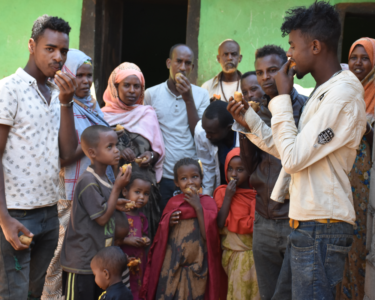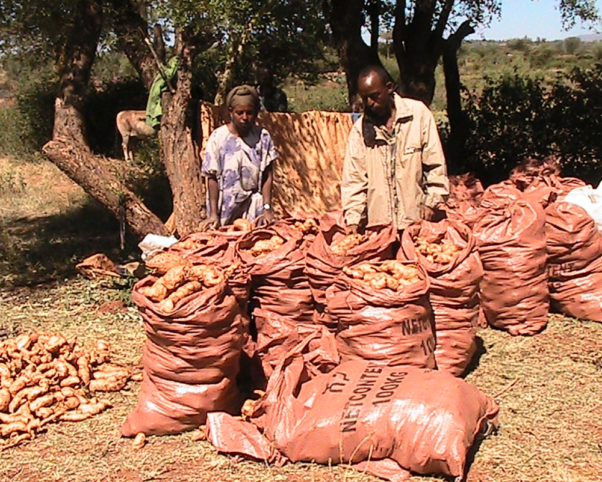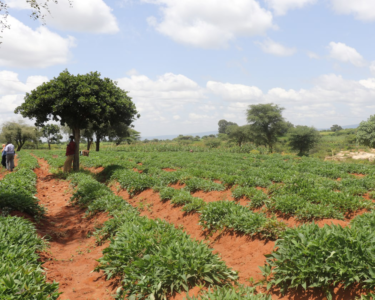
Mohammed Yusuf walks out of an unfinished house with no roof and heads to his field. While the home may not show it yet, Yusuf feels he is making progress for the first time in his 50-year life.
Born and raised Babile Woreda in Ethiopia, Yusuf has spent the past 30 years growing maize, sorghum, groundnut, and local sweetpotato cultivars to support his family of 11 people. Despite his commitment and hard work, he has struggled to provide enough food for his family. Money for doctor visits and education were often difficult to come by.
But things changed in 2020, when the Development and Delivery of Bio-fortified Crops at Scale (DDBIO) project arrived in his area. Funded by the UK’s Foreign Commonwealth and Development Office, and implemented by International Potato Center (CIP), DDBIO began promoting biofortified orange-fleshed sweetpotato (OFSP) among smallholder farmers with children under five years of age to address vitamin-A deficiency.
Yusuf was among the early participants in this program to try new varieties of sweetpotato and supported by trainings in land preparation, planting methods and seed cultivation, which were provided by officials from Haramaya Universityv and the Babile Woreda Office of Agriculture and Natural Resources. Eventually, 423 farmers (320 female) in Babile Woreda received the same trainings along with 211,000 OFSP vine cuttings that would yield 127 tons of sweetpotato after the next growing season.
Yusuf personally received 15,000 vine cuttings and planted these on 0.3 hectares of farmland. Following the protocols he had learned in training, Yusuf discovered just three months later that one cutting of OFSP grew up to 12 roots. In the fourth month, he applied the piecemeal harvesting approach he had learned during CIP training sessions: He dug up a few large roots for household consumption or sale and left the other plants in the field to continue growing and bulking.

Yusuf said after the training and first growing season, he could feed his family for five consecutive months. He noticed that the OFSP varieties he grew produced roots near the surface which meant the work was less onerous and suitable for women who had to undertake many other daily chores.
“I am relieved and happy to see OFSP in the hands of my children day and night. I can see that my children are healthier. They have more energy now.”
Yusuf also realized good profits on selling OFSP roots to a purchasing organization that obtains food on behalf of a small community of internally displaced Somalis. Relocated into the Oromia region, these internally displaced people are in dire need of adequate and nutritious food, especially for women in children.
Yusuf sold 3,000 kilograms of roots to the program, earning nearly USD 1,100. He used the income to finance the construction of his new house and to buy grain for diversifying his family’s diet. He deposited the remaining money in a savings account in a local cooperative bank and plans to use the money one day to install a grain mill in his village. His future is very bright, thanks in part to OFSP.
But OFSP is not just income for Yusuf. He truly enjoys the varieties provided to him by CIP.
“Unlike local sweetpotatoes, these varieties are tasty, stay fresh longer after cooking, and mature quickly in the fields. With the high vitamin A, it seems like the perfect food,” he says.

In addition to OFSP varieties and trainings, the DDBIO project is also helping to promote OFSP through food products exhibitions where Yusuf’s wife – Aliya – displays some of her best OFSP dishes including porridge, flatbreads, wot and injera.
Yusuf’s success is inspiring his neighbors to grow OFSP and they now turn to him for advice and consultation on growing methods. Next season, Yusuf will reserve a full hectare for OFSP and his spirits are higher than ever.
His success has inspired those around him, encouraging neighboring farmers to learn the benefits of growing OFSP. Farmers and trainers consider Yusuf as a model of the project both in terms of reaping benefits and sharing experiences. And now he gives back: Yusuf supports aspiring farmers by giving them free vine cuttings to plant their own OFSP for a brighter future.
By Setegn Gebeyehu (CIP), Mohammed Abinasa (CIP), Dandena Gelmesa (Haramaya University), and Kemal Kasim (Haramaya University)
The story is made possible by the generous support of the Development and Delivery of Bio-fortified Crops at Scale (DDBIO) project funded by the Foreign, Commonwealth & Development Office (FCDO) of the UK Government. The project has been implemented by the International Potato Center (CIP) and Haramaya University (HU), and other partners.

